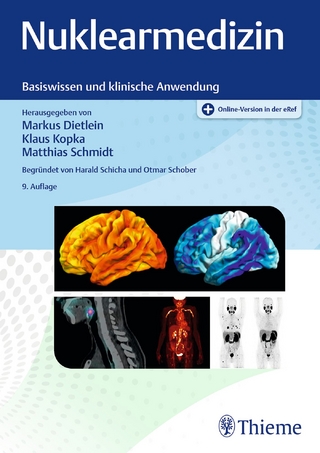
Physics of Radiology
Medical Physics Publishing Corporation (Verlag)
978-1-930524-22-4 (ISBN)
Nearly 200 additional pages of information
220 exercises - most with solutions
650 illustrations
10 appendices and 220 references
24-page index
This new, updated and expanded edition of a popular textbook on medical imaging is intended primarily for use by radiology residents and other interested physicians. In a relaxed, straightforward writing style, Dr. Wolbarst pulls together seemingly unrelated pieces of basic science and technology and illustrates how they fit together to form the foundation of medical imaging. He provides a great deal of detailed, practical information on how the various imaging technologies actually work and on the factors that affect their performance.
Nearly all of the equations are simple proportionalities, and the meanings of many of them are illustrated in the Exercises. The properties of the linear, exponential and sine functions, and the rudimentary ideas about probability and statistics that are needed, are reviewed in appendices to the chapters where they are introduced.
New chapters in this edition include ""Nuclear Cardiology, SPECT, and PET"": ""Spiral and Multi-Slice CT"": ""PACS, IMACS, and the Integrated Digital Department"": and a chapter on emergency response to radiological disasters and the roles that radiologists could assume.
Introduction
Introduction to Medical Imaging
-Sketches of the ImagingModalities
-X-Ray Imaging I:Overview of Film Radiography
Appendix: The Roleof Medical Physics in an Imaging Department
Scientific and TechnicalBasis
Radiation and Matter
-Mass, Motion, and Force
Appendix:Functions
-Electric Fields and Accelerating Electrons
-Magnetic Fields andElectromagnetic Waves
Appendix: Periodic Functions
-The Inviolate Rule of EnergyConservation
-Atoms and Photons
-Matter: Gases and Liquids, Metals,Superconductors, Insulators, and Semiconductors
-Resistors, Transistors, and All That:
An Introduction to Electronic Circuits
Appendix: Exponential and LogarithmicFunctions
Scientific Foundations for the Various Modalities
-Ultrasound ImagingI: Reflections of Acoustic Waves in Elastic Tissues
-Magnetic Resonance Imaging I: Nuclear Magnetic Resonance of Stable Hydrogen Nuclei in the Water Molecules of Tissues
-Gamma Ray Imaging I: Harnessing Radioactive Decay
Appendix: Derivativesof Functions
-X-ray Imaging II: Interaction of High-Energy Photons with AtomicElectrons
Appendix: Probability
-Radiation Dose I: The Detection and Quantificationof Ionizing Radiation
-X-ray Imaging III: Mapping Images on Film
-A Synthesis:Radioactive Decay, X-Ray Beam Attenuation, Nuclear Spin Relaxation, Cell Killing with Radiation, and other Poisson Processes
Analog and Digital Image Information
-ImageQuality: Contrast, Resolution, and Noise - Primary Determinants of the Diagnostic Utility of anImage
Appendix: Statistics
-Measures of Image Quality and of Imaging SystemCapabilities: PSF, MTF, DQE, ETC.
-The Psychophysics of Optical Images
-VacuumTube and Solid-State Optical Cameras and Displays
-Digital Representation of anImage
Appendix: Computer Basics and a Bit about Bytes
-PACS, IMACS, and the Integrated Digital Department
Analog Radiographic and FluoroscopicImaging
X-Ray Imaging IV: Creation of an X-Ray Beam
-The Nuts and Bolts of X-Ray Generators
-Design of an X-Ray Tube
-Transforming Electron Kinetic Energy int Bremsstrahlung and Characteristic X-Ray Energy
X-Ray Imaging V: Capturing the X-RayImage on Film
-Creating the Primary X-Ray Image Within the Body
-Scatter Radiation,Grids, Gaps, and Contrast
-Capturing the Primary X-Ray Image with Cassette andFilm
-Resolution and Magnification
-Optimal Technique Factors
-Radiographic Quality Assurance
-Screen-Film Mammography
-Some Infrequently Used Screen-Film Techniques
X-Ray Imaging VI: Fluoroscopy-Following Time-Dependent Processes with Fluoroscopy
Digital ImagingX-Ray Imaging VII: Digital X-Ray Imaging
-Digital Radiography, Computed Radiography, and Flat-Panel X-RayTechnology
-Digital Fluoroscopy and Digital Subtraction Angiography
-ComputedTomography I: Creating a Map of CT Numbers
-Computed Tomography II: ImageReconstruction, Image Quality, and Dose
-Computed Tomography III: Spiral and Multi-Slice Scanning
Gamma Ray Imaging
-Gamma Ray Imaging II: Radiopharmaceuticals
Appendix: Radioactive Transformations
-Gamma Ray Imaging III: Image Production, Image Quality, and Dose
-Gamma Ray Imaging IV: NuclearCardiology, SPECT, and PET
Magnetic Resonance Imaging
-Magnetic ResonanceImaging II: The Classical View of NMR
-Magnetic Resonance Imaging III: RelaxationTimes (T1 and T2), Pulse Sequences, and Contrast
-Magnetic Resonance Imaging IV: ImageReconstruction and Image Quality
-Magnetic Resonance Imaging V: Fast, Flow, andFunctional Imaging
-Magnetic Resonance VI: Biological Effects and Safety
UltrasoundImaging
-Ultrasound Imaging II: Creating the Beam
-Ultrasound Imaging III: ImageProduction and Image Quality
-Ultrasound Imaging IV: Biological Effects andSafety
Experimental and Future Imaging Technologies
-Evolving and Experimental Technologies in Medical Imaging
Radiation Dose, Biological Effects, Risk, and Radiation Safety
Ionizing Radiation Dose, Biological Effects, and Risk
-RadiationDose II: Determining Organ Doses from Exposure Measurements
-Radiation Dose III: The Tissue f-Factor, Tissue-Air Ratios, etc.
-Radiation Dose IV: RadiobiologicalProcesses and Effects
-Radiation Dose V: Probabilities of Occurence of Stochastic HealthEffects
Appendix: On talking with People about Radiation (and Other)Risks
-Radiation Oncology and the Role of Imaging in Treatment Planning
Radiation Safety and Emergency Response
-Practical Radiation Safety for IonizingRadiation
-Rems, Risks, and Regs: The Legal Basis for Radiation ProtectionStandards
-Response to a Major Radiological Emergency
Solutions to the Exercises
References
Some Symbols and Units
Index
| Erscheint lt. Verlag | 1.2.2005 |
|---|---|
| Verlagsort | Madison, WI |
| Sprache | englisch |
| Maße | 216 x 279 mm |
| Themenwelt | Medizin / Pharmazie ► Medizinische Fachgebiete ► Onkologie |
| Medizinische Fachgebiete ► Radiologie / Bildgebende Verfahren ► Nuklearmedizin | |
| Medizinische Fachgebiete ► Radiologie / Bildgebende Verfahren ► Radiologie | |
| Naturwissenschaften ► Physik / Astronomie ► Angewandte Physik | |
| ISBN-10 | 1-930524-22-6 / 1930524226 |
| ISBN-13 | 978-1-930524-22-4 / 9781930524224 |
| Zustand | Neuware |
| Haben Sie eine Frage zum Produkt? |
aus dem Bereich


